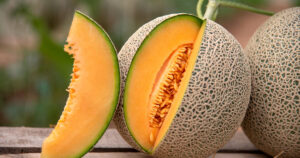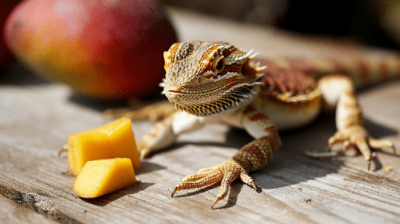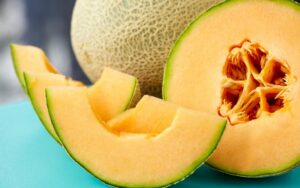Curious about whether it’s okay to give your bearded dragon cantaloupe? You’re not alone! Many pet owners wonder about the dietary options for their scaly friends. Let’s explore the question: Can bearded dragons have cantaloupe?
Yes, bearded dragons can have cantaloupe, but it should be offered in moderation. Cantaloupe can be a tasty treat for your beardie, providing hydration and some essential vitamins. However, it should only be given occasionally and in small, bite-sized pieces to prevent digestive issues.
Remember to remove any seeds or rind before serving, as they can be difficult for your beardie to digest. Always ensure a balanced diet for your pet, with a variety of appropriate fruits, vegetables, and insects.
Can bearded dragons have cantaloupe?

Bearded dragons can indeed eat cantaloupe, but it should be offered in moderation and as part of a balanced diet. Cantaloupe can provide some hydration and essential vitamins for your beardie, such as vitamin A and vitamin C. However, it’s important to remember a few key points:
- Moderation: Cantaloupe should only be offered occasionally as a treat, not as a staple food. Too much fruit in a bearded dragon’s diet can lead to digestive issues and obesity.
- Preparation: When offering cantaloupe to your bearded dragon, make sure to remove the seeds and rind, as these parts can be difficult for them to digest and may pose a choking hazard.
- Variety: Cantaloupe should be part of a varied diet that includes other fruits, vegetables, and insects to ensure your bearded dragon receives all the necessary nutrients.
- Observation: Always monitor your bearded dragon after introducing any new food, including cantaloupe. If you notice any signs of digestive upset, such as diarrhea or lethargy, discontinue offering cantaloupe and consult with a reptile veterinarian.
Factors to consider before introducing cantaloupe
Before introducing cantaloupe to your bearded dragon’s diet, there are several important factors to consider:
- Age: Young bearded dragons (under 6 months old) have different dietary needs compared to adults. They require more protein and calcium for growth and development. While cantaloupe can be offered as an occasional treat, it should not replace the main components of their diet, such as insects and leafy greens.
- Health: Consider the overall health of your bearded dragon. If your pet has any pre-existing health conditions or digestive issues, it’s essential to consult with a reptile veterinarian before introducing new foods like cantaloupe.
- Balance: Cantaloupe should be part of a balanced diet that includes a variety of fruits, vegetables, and insects. Ensure that cantaloupe is not the sole or primary source of nutrition for your bearded dragon.
- Preparation: Properly prepare the cantaloupe by removing the seeds and rind before offering it to your bearded dragon. The seeds can be a choking hazard, and the rind is difficult to digest.
- Observation: Monitor your bearded dragon closely after introducing cantaloupe. Watch for any signs of digestive upset, such as diarrhea, vomiting, or lethargy. If you notice any concerning symptoms, discontinue feeding cantaloupe and consult with a reptile veterinarian.
- Frequency: Offer cantaloupe as an occasional treat rather than a regular part of your bearded dragon’s diet. Too much fruit can lead to obesity and other health issues.
By considering these factors and proceeding with caution, you can safely introduce cantaloupe to your bearded dragon’s diet as a tasty and nutritious treat.


